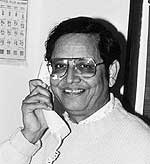 Who should be primarily responsible for controlling corruption?
Who should be primarily responsible for controlling corruption? The political parties and society have both encouraged corruption. There needs to be a change of attitude. Laws have been promulgated, but not implemented, and people in responsible positions are reluctant, disrespectful even, towards their duties. Even the general public is unconcerned about respecting laws and regulations to help control corruption.
What do you think of the recent moves of the Commission for the Investigation of the Abuse of Authority?
The recent CIAA operations send out a strong message against corruption and have raised hopes that things can change. And it is a warning to delinquents.
The CIAA actions have allegedly left out the big bosses in corruption. Do you think they will get away?
This is only a start, no one has yet escaped. This is not a question of big and small, it is a procedure. Besides, the government needs to get moving on controlling corruption and punishing it within ministries and offices, not the CIAA. There is a law that requires that all holders of public positions declare their property. Why are prime ministers and ministers reluctant to respect this legal provision? The CIAA should only be responsible for cases that escape this legal mechanism to check corruption.
Government should think about the impact on the national economy, and consider having consultations with the business sector and the CIAA to find an effective way of fighting corruption. If the government does not support the CIAA with prompt actions to activate the constitutional anti-graft functions, this campaign is lost.
Do you agree with the allegations that the police force, courts, infrastructure construction, irrigation, electricity authority, civil aviation and administration sectors are the most corrupt areas?
I would say that the commercial sector is the most corrupt. The country probably lost around Rs 20-22 billion for revenue officers to earn the Rs 6 billion confiscated in the CIAA raids. And there is a popular belief that corruption of such magnitude is taking place because of political patronage. So you could say that politics is the most corrupt sector. The CIAA should not limit itself to the revenue sector only. Without a drastic improvement in the political, cultural and competitive environment, raids alone will not achieve much. There should be immediate action to make the upcoming elections transparent-people have the right to know about the candidates' fundraising process. The CIAA raids cannot bring this to the people.
Can a provision be formulated to prevent people charged with corruption from contesting elections?
Definitely, we have been demanding it. We cannot prevent anybody from standing unless there are proven charges against them, but parties need to be concerned about allegations too.
You were a minister with the interim government and are now president of Transparency International here; do you think the scale of corruption now threatens democracy?
Corruption was there before democracy too, but it might have increased in the last 12 years. But that it has increased is not because of a fault in the system, but due to the weakness of the parties and leaders. If corruption threatens democracy, we have to commit ourselves to starting another campaign for democracy and a new constitution. But it will be better if we can move forward with what we already have.


